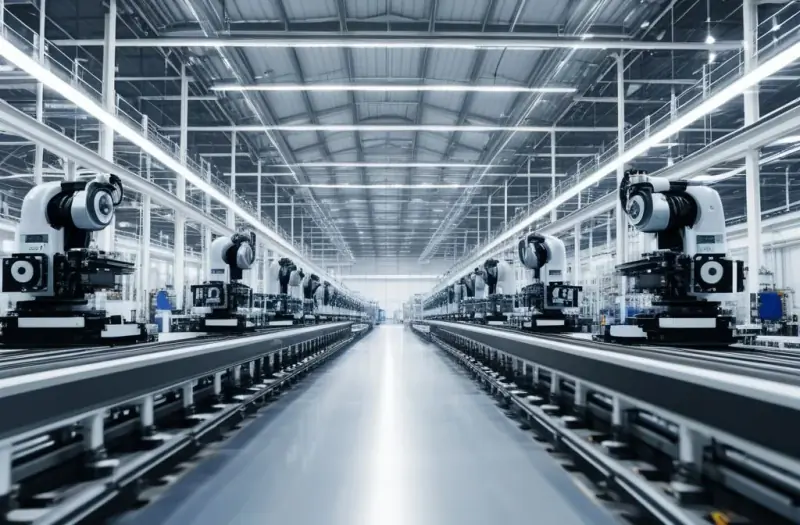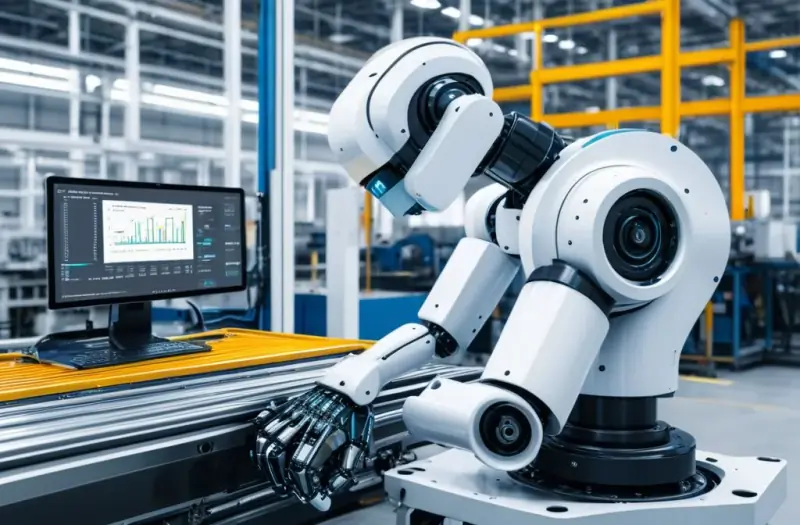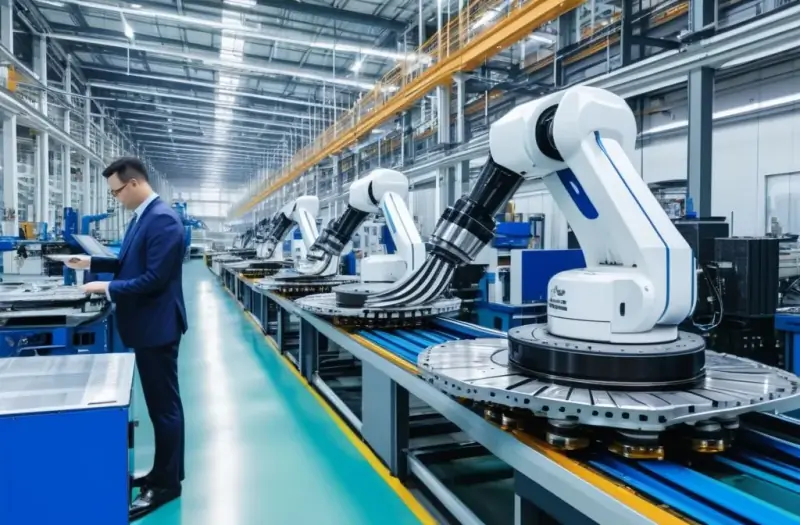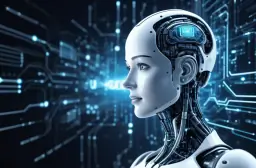How is AI Used in Manufacturing: Enhancing Efficiency

Table of Contents
Artificial intelligence (AI) has become an integral part of manufacturing, driving efficiency, precision, and scalability like never before. As industries around the globe look for ways to stay competitive, AI in manufacturing offers transformative opportunities to optimize production, reduce costs, and ensure quality standards. In this article, we’ll explore how AI is reshaping the manufacturing landscape and discuss the technologies leading this evolution.
The Rise of AI in Manufacturing

AI has quickly moved from a novel concept to an essential component of the modern factory. Today, artificial intelligence in production is synonymous with advanced manufacturing—it’s used to streamline processes, automate repetitive tasks, and bring intelligence to machinery and robotics. Machine learning in manufacturing, a subfield of AI, plays a significant role by enabling systems to learn from data, adapt to changes, and predict outcomes. These applications not only enhance efficiency but also open the doors to what we now call “smart factories.”
AI has a vast range of applications across the manufacturing lifecycle, including product design, supply chain management, predictive maintenance, and real-time monitoring. As industrial AI becomes more accessible and sophisticated, manufacturers can create data-driven manufacturing strategies that are more responsive and proactive.
Key Applications of AI in Manufacturing
AI applications in manufacturing span from operational processes to quality assurance. Let’s examine some prominent uses of AI across the sector.
AI-Driven Predictive Maintenance
Predictive maintenance has changed how manufacturers maintain equipment, preventing downtime and reducing maintenance costs. By implementing machine learning algorithms, factories can monitor machinery for signs of wear and tear or potential failures, thus addressing issues before they impact production. This proactive approach leads to higher equipment reliability and lower maintenance costs, with fewer unplanned stoppages.
- Benefits of predictive maintenance:
- Reduces unexpected downtime
- Extends the lifespan of machinery
- Improves productivity and efficiency
Predictive maintenance relies on deep learning in production, allowing machines to detect anomalies, learn from historical data, and predict maintenance schedules based on usage and operational patterns.
AI for Quality Control and Inspection
Quality control is critical in manufacturing, and AI enhances this process by introducing automated inspection systems. Traditionally, inspection relied on human intervention, which was not only time-consuming but also prone to errors. With computer vision in manufacturing, AI-powered automation can analyze products in real time, detecting defects with higher accuracy than the human eye.
For instance, using high-resolution cameras and machine learning algorithms, AI systems can inspect items for minute defects, ensuring they meet quality standards. This not only boosts product quality but also reduces waste as defective products can be caught early in the production line.
Robotics in Manufacturing and Smart Factories
Robotics in manufacturing has been around for years, but integrating AI transforms these machines from simple automations to intelligent co-workers. AI-driven manufacturing processes employ robotics equipped with sensors, cameras, and algorithms, enabling them to perform complex tasks and adapt to different environments.
Modern intelligent manufacturing systems create smart factories that continuously learn and optimize their operations, driven by AI. This type of setup enables more flexible, agile manufacturing, where systems can switch tasks or configurations based on demand and production needs.
AI in Supply Chain Management
AI’s role extends beyond production and into the supply chain, where it enhances visibility, agility, and risk management. By analyzing data from suppliers, logistics, and customer orders, AI enables more precise demand forecasting and inventory management. Incorporating AI in supply chain management allows manufacturers to anticipate changes, avoid delays, and optimize delivery times.
Using AI for supply chain management can lead to:
- Reduced inventory costs
- Improved order accuracy
- Increased customer satisfaction
This integration of AI in industrial operations improves efficiency and minimizes bottlenecks, allowing manufacturers to respond more effectively to market dynamics.
Advanced AI Technologies Enhancing Manufacturing

AI technology in manufacturing continues to evolve, introducing new and advanced systems into production. Here are some of the latest innovations:
Machine Learning and Data Analytics
Machine learning and data analytics are at the heart of AI-enhanced manufacturing. By analyzing massive datasets, AI systems can identify trends, predict demand, and optimize production schedules. Data-driven manufacturing helps manufacturers make better decisions based on real-time data and historical insights, leading to more agile and responsive manufacturing.
Digital Manufacturing Solutions
Digital manufacturing solutions combine AI and IoT (Internet of Things) to create a connected, efficient factory environment. With AI analyzing data from IoT devices, manufacturers gain insights into equipment performance, product quality, and production speed. This connected infrastructure forms the backbone of digital transformation in manufacturing.
Digital manufacturing offers:
- Improved operational efficiency
- Enhanced decision-making through real-time insights
- The ability to simulate production scenarios and optimize processes
AI-Powered Automation for Workflow Optimization
Automation is a fundamental aspect of AI-driven manufacturing processes, where machines manage repetitive tasks with precision and speed. AI-powered automation allows for seamless workflow optimization, with machines capable of handling tasks that once required human intervention. By minimizing manual labor, factories reduce the risk of human error and boost overall productivity.
FAQs: Common Questions About AI in Manufacturing
What is AI in manufacturing?
- AI in manufacturing refers to the use of artificial intelligence technologies, such as machine learning, robotics, and computer vision, to optimize production processes, enhance quality control, and manage supply chains more effectively.
How does predictive maintenance work?
- Predictive maintenance uses machine learning algorithms to monitor equipment and predict failures before they occur, preventing downtime and reducing repair costs.
Can AI improve product quality?
- Yes, AI can improve product quality through automated inspection systems that detect defects and inconsistencies, ensuring only high-quality products reach customers.
Is AI adoption expensive in manufacturing?
- Initial AI implementation can be costly; however, the long-term gains in efficiency, reduced waste, and improved production quality often outweigh the initial investment.
What are the main benefits of AI-powered automation?
- AI-powered automation increases productivity, minimizes human error, and allows for faster, more flexible production processes.
Conclusion
AI in manufacturing is fundamentally reshaping the industry, allowing companies to move beyond traditional methods and adopt innovative, data-driven approaches. With AI-driven predictive maintenance, quality control, robotics, and supply chain management, manufacturers are realizing new efficiencies and improvements. As technology continues to advance, the future of manufacturing will likely be defined by even smarter, more autonomous production systems that are fully integrated with AI.
Key Takeaways
- AI enhances efficiency in manufacturing by automating tasks, optimizing workflows, and enabling predictive maintenance.
- Quality control benefits from AI-powered inspection systems that detect defects early, ensuring high product standards.
- Robotics and smart factories are transforming traditional factories into intelligent, adaptable environments.
- AI-driven supply chain management offers better demand forecasting and improved customer satisfaction.
- As AI in manufacturing evolves, we can expect even more integration and innovation across the industry.
Popular Tags
ADS SPACE HERE

